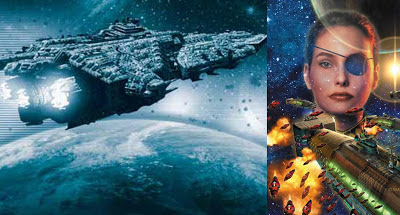David Weber is an avid historian and draws extensively on history for inspiration. The Napoleonic wars are important but in some ways this is a front – there are coded references to other historical eras everywhere if you start to look for them. The ships of the Star Kingdom have impenetrable shields above and below. As a result they fight like sailships, firing broadsides then rolling to fire double-broadsides, crossing the enemy T, forming walls of battle and so on, with only a little adaptation for three-dimensional theatres and gravity wells. It’s contrived but artfully so, and other features such as the Warshawski hyperspace sails uphold the sailship analogy.
The battles and wars in the Honor Harrington series are often recreations of real historical and political dilemmas: the different attitudes towards losing commanders on British and French sides, for example, or the social pressures that might lead a society first to republicanism and then to war.
Hemry’s background is his own Navy service. While his backstories are equally detailed, the links to specific nations or cultures are much less clear - instead the Alliance seems to be a generic feudal culture while their opponents, the Syndicated Worlds, are an equally generic business-led society where ships are commanded by CEOs. Also, where Weber’s writing celebrates history, Hemry’s seems to celebrate physics: in particular relativistic distortion becomes a major theme in every battle. On the other hand the ships of the Lost Fleet are not constrained by seafaring tactics and, once Blackjack Geary manages to stop his captains’ overreliance on the Suicidal Head On Charge, the 3D tactics become fascinating.
By choosing a more generic setting, Hemry’s writing is less about the morality of specific historical wars and more about the morality of war in general: atrocities and murders, treatment of prisoners, the importance of tactics, the politics, and the value of basic discipline, as well as the human cost of war. These issues come up in the Star Kingdom too, of course, just as they do in real life.
But all this distracts from the most important question: who would win in a fight? Fleet to fleet they are well matched: both are strategic and tactical genii, both have, at times, faced overwhelming odds and snatched victories from the jaws of defeat, both have turned rivals amongst their own captains into faithful allies, and importantly both make their own luck by responding quickly and intelligently to situations. They’re both devious as hell too – expect a battle full of feints, diversions, melodramatics and underhand tactics. Geary might have a slight edge simply because he’s used to commanding a much larger fleet. On the other hand, in a face-to-face combat situation, I don’t think Geary would stand a chance against the coup de vitesse.









11 comments:
I've never heard of these authors or their books, but your review was thoroughly interesting.
Military sci-fi is, shall we say, an acquired taste - even for those familiar with other sci-fi. When it's done well it's gripping, as well as a fresh way of exploring these themes, and there are lots of strong and interesting characters.
Probably the closest thing to military sci-fi is historical military fiction - e.g. If you enjoyed the seafaring novels of Patrick O'Brien you might very well enjoy David Weber too.
Thanks!
I'd vote for Black Jack simply because I've actually read those books. I keep meaning to try the Honor Harrington stuff - one of these days.
My favourite military SF writer is John Ringo - his Posleen War stuff was something I found by accident and I've been working though them ever since.
I've never heard of these books, either, but military sci-fi sounds awfully interesting to me. I need to check them out!
Thanks for dropping by Janene and Big D! I haven't read the Posleen novels yet. I did read a series - March Upcountry - written by John Ringo in collaboration with Weber, this is another interesting sub genre where, although the setting is still interplanetary, the characters have to rely on historical weapons and tactics.
When I think of military scifi I think of "Ender's Game" and "Starship Troopers." I agree with you that the best have a historical basis.
I loved the March Upcountry books too!
Apparently John Ringo gets quite fed up with people asking if he's ever going to do another one.
Starship Troopers is fascinating Maurice - I think there's a lot to say about the book and also the film, above and beyond the debate about the questionable politics. I might do a post about it at some point. I have to admit I haven't read Enders Game yet - I'm now in a hurry to read it before the film comes out.
BigD, if I ever interview John Ringo I'll be sure to tell him you asked... meanwhile I'll get on to Posleen as soon as I'm finished with Enders Game.
As I have read both series avidly (and thoroughly enjoyed both) I was very interested to read your comments. Thank you so much; you have given me a lot to mull over regarding similarities and differences between the two. I will also try the Posleen series, as well. Cheers
Honor Harrington has a far more detailed and realisitic socio-politic underpinning. Geary's sindic and alliance are cartoon-ish entities by comparison. Geary fills the gap when an HH book isn't available. Note also Tales of Honor comic adaptation started just last month.
Yes I think I agree: definitely much more development of the various societies in HH novels, much of which reflects the author's love of history. In some ways David Weber is a sci-fi George R.R. Martin.
I'm certainly excited by the comic book adaptations, not least as they are also being released as groundwork for the proposed movie.
Post a Comment